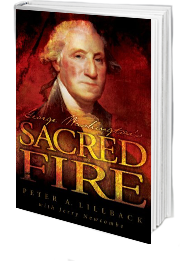Providence Today: Trouble in the “New Jerusalem”
Jerry Newcombe:
The Puritans who settled Boston and other parts of New England set out to create the new Jerusalem in the New World. Of course, in that they failed to create the New Jerusalem, but they did succeed in laying out much of the framework for what became the United States of America. Right now, we want to take a look at two incidents in the 17th century that could have easily derailed their effort to create a new nation under God.
Speaker 2:
The pilgrims who settled Plymouth had signed a treaty of peace with the Indians that lasted more than half a century. That treaty was negotiated by Chief Massasoit and on behalf of the pilgrims, by Edward Winslow, a passenger on the Mayflower. His son was unwittingly involved in the center of the controversy, which undid that treaty of peace of 1621.
Leo Martin:
50 years later, we had the King Philip War. King Philip was not a European, he was Massasoit’s son. His Christian name was Philip. He went to negotiate not to go to war with the then governor of Plymouth, Josiah Winslow, Edward Winslow’s son. While in negotiating, Philip said to Winslow, he says, “Hey, I’m a chief, you’re just a governor. I’m not going to talk to you, I’ll only talk to kings.” They broke off the negotiations and went to war. From that day forward, Philip was referred to as King Philip, because he would only talk to kings and the two men who became great friends, their two sons went to war a generation later.
Leo Martin:
Two issues here. Did the pilgrims treat the Indians with respect? Yes. Do we have a generational problem? Yes. Edward Winslow was the best negotiator we ever had. He was instrumental in helping Massasoit survive and writing the peace treaty. His son was instrumental in the starting of the King Philip War.
Speaker 2:
The fighting began on the outskirts of Plymouth, but quickly spread to other regions in New England.
Leo Martin:
As a matter of fact, the King Philip War hardly took place in Plymouth at all. One attack in Plymouth was where the plantation is today. Where you see their reception hall, that is where the only Plymouth attack was and we did lose some pilgrims in that attack, but it was mostly down in Rhode Island and Connecticut and down in that area, not here in Plymouth.
Speaker 2:
Virtually every colonial family in New England was impacted by this war. Although it was vicious, this war, which began in 1675, lasted only about one year. It came to an end when an Indian fighting against King Philip, shot him.
Speaker 2:
The Puritans are little remembered today for their contributions to democracy, to constitutionalism, to education like Harvard, Yale, and Dartmouth. Instead, they are often remembered for an ugly and short episode in 1692 in the city of Salem.
Speaker 4:
The devil himself told me he picked her to be his queen. She murdered 13 people.
Speaker 2:
The Salem witchcraft trials began when the Puritans in that town began to allow for accusations, even by just one person, an unbalanced one at that, to be good enough to convict someone of supposedly being a witch. 19 people, mostly women, virtually all of whom declared their innocence were put to death. Most of them were hanged. One accused man was crushed to death under a large stone. None were burned.
Speaker 2:
Meanwhile, when the father of Cotton Mather, Increase Mather returned from England in the fall of 1692, he was shocked that his fellow Puritans were not following the Bible’s clear command that any crime must be established by the testimony of two or three witnesses, not just one. Once that principal was reestablished, the accusations stopped and the jail with other supposed witches was opened and they were released. Soon after the hysteria, those jury members who had been involved in convicting the condemned, signed a statement of regret.
Speaker 5:
I do not petition your heart for my own life. I plead now only for others.
Speaker 6:
“Increase Mather and he alone brought the murders to an end.” (Perry Miller)
Speaker 7:
“The real work of the devil was the hanging of an innocent old woman.” (Increase Mather)
Jerry Newcombe:
Puritans are often remembered today only for the Salem witchcraft trials, but their legacy is much richer than that. Such as framing the first complete constitution on American soil, free and private elections, the schools they started like Harvard, Yale, Dartmouth, and Brown, and a great emphasis on civil liberties. When they stuck with the Bible, things went wonderfully. When they ignored the scriptural principles, as happened with the unjust Salem witchcraft trials and hangings, that’s when they got off track. A good lesson for us to remember today. For Providence Forum, I’m Jerry Newcombe.
